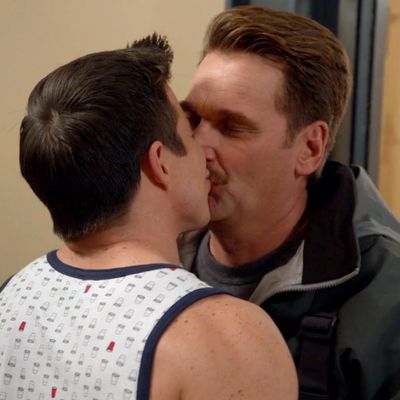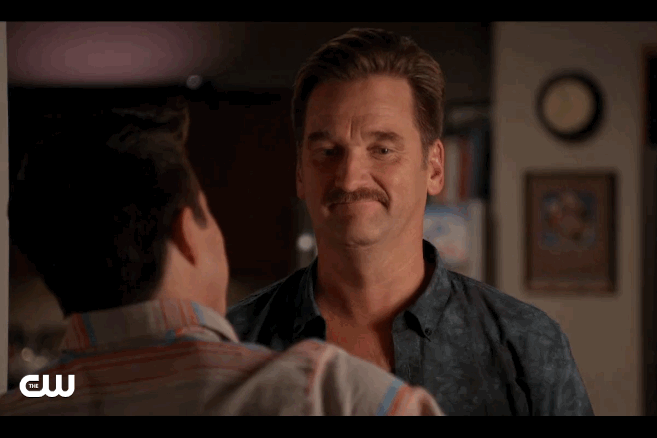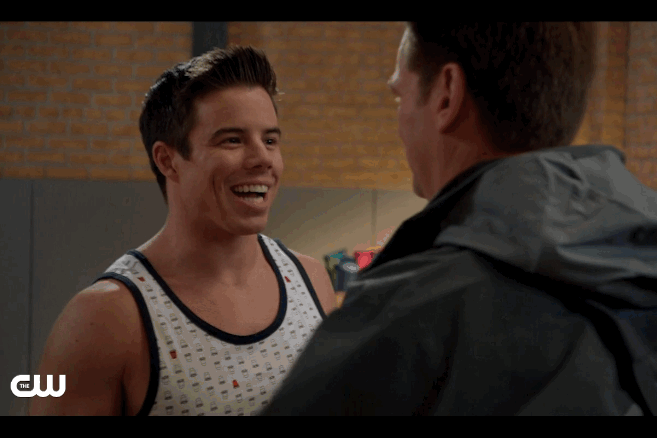
Something delightful is happening on Crazy Ex-Girlfriend: Rebecca’s bumbling, mustachioed boss, Darryl Whitefeather, and White Josh, a member of Josh Chan’s entourage, are dating. It all started with a good-bye kiss on the cheek from Josh (played by the bluntly good-looking David Hull), which landed perilously close to Darryl’s lips. The kiss sends Darryl (charmingly acted by Pete Gardner), recently divorced from his wife, into an identity-crisis tailspin: What does it mean? Is he gay? Is he just gay for White Josh? Wait: Could it be that he’s attracted to both genders? Darryl eventually comes upon this realization during cardio mambo class, where he finds the bouncing butts of both the men and the women equally appealing. “I like both sexes,” he breathlessly tells Josh. “I’m a both-sexual!”

Darryl marks a refreshing break from how male bisexuality has been represented on television in the past few years, where dramas have more often used it as a shock tactic. (While female bisexuality is in some ways more fraught, it’s also more varied, with well-developed bisexual characters in Transparent, Orange Is the New Black, The 100, and Grey’s Anatomy.) In Halt and Catch Fire, Lee Pace’s character Joe MacMillan pointedly uses gay sex as a weapon. In the first season, he gets cornered into a bad deal with a rich Southern dilettante named Louise Lutherford (Jean Smart) and, in the ultimate power move, pounds her boy toy in her own mansion to scuttle the deal. On Mr. Robot, corporate Über-mensch Tyrell Wellick (Martin Wallström) pulls a similar move. The aspiring CTO of Evil Corp has sex with the CEO’s male assistant so he can hack into his phone to find out the identity of his rival. As a technology expert, surely Tyrell could have fathomed a different method, but the surprise gay sex hammered the point that this man would literally do anything (anyone?).
These representations of male bisexuality are provocative because the men were presumed to be heterosexual up until that point (they invariably have female love interests on their shows). Their sexual encounters with other men are staged to heighten their masculinity rather than diminish it: They are powerful men because they rise above the plebeian boundaries of sexuality. One of the ultimate examples of this is Kevin Spacey’s megalomaniacal Frank Underwood from House of Cards, who decompressed with a ménage à trois with Claire and his bodyguard, Meechum. These men are inheritors of American Psycho’s Patrick Bateman, where power, narcissism, and sex converge in a slightly ludicrous frenzy. Their sexuality is less of an identity than it is an act.
There’s admittedly something alluring about this lability, since it acknowledges that sexual identities can be flexible. But it’s ultimately reductive because it views sex and sexuality simply as a form of power. As seductive as the power bisexual may be, he’s still a concept rather than a person. Darryl’s story line on Crazy Ex-Girlfriend is unusual because his sexuality hasn’t been a one-off device but a process of discovery. The viewer knows as much about Darryl’s sexuality as he does, so when we arrive at the moment when Darryl admits he’s attracted to Josh, it’s liberating. He finally understands who he is and can articulate what he wants. (Who among us can say the same?) And as an hour-long musical comedy, the tone and form of Crazy Ex-Girlfriend gives it the freedom to provide a winking meta-commentary on sexuality throughout Darryl’s coming-out process. It’s cheeky without being flippant, thoughtful without being didactic.
Make no mistake, the world of Crazy Ex-Girlfriend can feel like a zanier, more idealized version of reality, but the show is also savvy about envisioning a believably progressive world. Certain things are simply taken as a given: Of course Josh Chan is the ultimate babe. Of course White Josh is gay. Instead, the show is not interested in the fact of Darryl’s bisexuality but in exploring how one navigates a new identity. Darryl’s comfort level around publicly dating another man becomes a sticking point in their budding relationship: He wanted to keep things quiet, whereas Josh isn’t about to go back into the closet. It’s still a conversation around sexuality, but it also tells us a lot about those two people and how comfortable they feel in the world they live in.
Pairing Darryl and Josh works so well in particular because they’re a classic case of opposites attract. Darryl is older, divorced, socially awkward, and thirsty for friends and affirmation. While at first Josh seemed like the prototypical frat boy with a strong tank-top game, he’s also slowly proven himself to be kind and considerate (He cleaned Darryl’s bathroom! He showed up to support them in court!). If anything, what’s surprising about their romance is not either character’s sexuality but why these two very different people might be into one another to begin with. In the last episode, Darryl loudly proclaims, “I am bisexual! I’m going for drinks with this gay man whom I have a crush on,” and a passerby shouts out, “He’s way out of your league!” White Josh is ready to defend his man: “Hey, back off, dude! He looks like Tom Selleck!”


